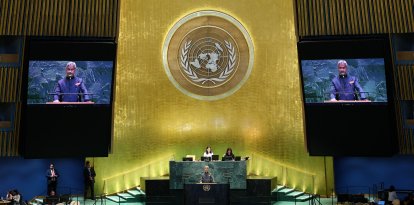Who killed Shanti de Corte? Who will kill Zoraya ter Beek?
Thousands of people with a whole life ahead of them are requesting the service of being 'legally killed'. We cannot tolerate that the State becomes the executioner of those who suffer from sadness or depression.

(Voz Media - Cassis - The Free Press / YouTube)
In early 2016 Ibrahim el Bakraoui, along with other accomplices, planned an ISIS-sponsored terrorist act. Ibrahim blew himself up by detonating a bomb at Brussels airport. Along with him, 32 people were blown to pieces and more than 300 were injured. Standing a few feet away from the bomber was Shanti de Corte, 17, who was waiting for her schoolmates to finish their paperwork, with whom she would embark on her graduation trip to Italy. Shanti was uninjured but saw Ibrahim and his schoolmates torn apart in mid-air. The trauma this inferno caused her marked the rest of her adolescence.
According to her mother, Marielle, during the following vacation, in 2016, "she never left the hotel even once. She did not want to go to places where there were other people". The school psychologist, who attended several of the students affected by the attack, said that the girl was "traumatized by the attack," which makes sense and all this is (if I may use the word) normal.
But in May 2022, at the age of 23, Shanti was murdered by order of the Belgian state. Her jury: a herd of doctors and psychiatrists who said that the disorder and depression, which the little girl suffered as a result of the attack, were uncurable. Shanti, a perfectly healthy young woman in a state of great anguish, had asked for euthanasia and was granted it. The bureaucrat in charge of the case said that Shanti "was in such a state of mental suffering that her request was logically granted." Yes, the word used was: logically.
Western civilization is a great civilization because it evolved in the ways of dealing with criminals and enemies.
The terrorists accused of the airport bombing will go through a long trial, and many human rights advocates will seek to have them treated in a "cotton wool suit" with all the necessary physical and mental health rights. Also clamoring for the rights of the killers will be the media, artists, NGOs, politicians and other yerbas who will opine about the conditions of their incarceration. However, they will say nothing about Shanti's death, moreover, they will consider it a logically accepted death.
The Belgian state will not execute the terrorists who massacred the bodies of Shanti's companions because centuries of evolution of Western culture prevent this from happening. That is why Western civilization is a great civilization, the civilization that evolved in the ways of dealing with criminals and enemies. Our civilization is the one that invented the concept of human rights with the universal force and depth that we know them. But from the same powerhouse that embryonically created the concept of universal human rights arose, however, an all-powerful and psychopathic State that is shocked by the idea of killing terrorists for the responsibility of their atrocities, but that does allow itself to kill a victim of those atrocities, because it does not know how to contain their suffering and considers that such suffering is "incurable."
Bioethics is a hard and complex terrain, without clear borders and always full of pain, despair, anger and shame. The circumstances surrounding the decision to end one's own life are always extremely painful and the intervention of third parties in such decisions has, in many disciplines and fields of knowledge, aroused intense debate. Cruel diseases, degenerative diseases, those that leave people in a vegetative state are part of this dispute and undoubtedly involve controversy, as well as laws concerning the role of physicians and their own autonomy to perform practices that conflict with the primary objective of their profession. But this was neither the case nor the circumstances.
Instead, it was a matter of the State making available services to execute a young girl with a deep depression caused by an attack that took place a few years ago. This is not a palliative, it is a service, a new service of the Benefactor State. It is something that exceeds all the frameworks of an ethical, civilized or moral discussion. The West, our civilization, is opening the door to get rid of those who suffer from a mental disorder or, simply, of the sufferer. Where are personal decision and responsibility in this quagmire? How will psychiatry distinguish who to treat or who to send to the clutches of death because their anguish "will not be cured"? How will they certify that such pain does not cloud the senses and judgment?
An irreversible error... and an increasingly common one
To end, from the State apparatus, the lives of vulnerable people, implies recognizing either that the State does not make sense or that it has devolved into a monster with no way of return. Quite frankly: is this what we need a State for? Obtaining legitimacy, funding and support to become the executioner of victims of terrorism, the innocent and the vulnerable is far from being the epitome of a civilization that put the defense of rights as its standard.
The news of Shanti's death occurred quite some time after her execution. The attempt to scribble these lines, in some logical order, came and went because of the adversity of having to explain the obvious. It is not a question here of pointing out individual decisions, nor a religious appeal nor a condemnation of the individual act of living or not living as each one sees fit. It is about granted to the State an irreversible power: the role of promoter of inclusive suicides that "do not discriminate" against applicants. The horrendous story of Shanti's double victimization is given density by the profusion of news stories about new euthanasias granted to eligible young people only because of a psychological condition or disorder.
In Canada, state-provided assistance in dying (MAID) has been expanded and has been extending "eligibility." As early as 2019, a Quebec Superior Court ruling had questioned the constitutionality of restricting this "right/service" to those whose death was reasonably foreseeable. A new federal bill was then introduced to extend eligibility without limiting it to the imminent end of life. Initially, and moreover, Bill C-7 clearly excluded psychiatric disorders, but in February 2021, after some politicians declared that this exclusion was "discriminatory" an amendment was introduced that canceled the exclusion for mental illness after 2 years. Since 2023, Canada has lax requirements for euthanasia and it is not the only place, the Netherlands, Switzerland, Belgium, Spain, Australia and New Zealand, as well as several US states.
Since these measures were passed people obtaining assisted suicide have continued to increase and thousands of people with an entire life ahead of them are applying for the service of being legally killed. In recent years progressive ideology has pushed the boundaries of what a "reasonably foreseeable" death means by making eligible applicants who simply suffer from a condition they find "intolerable" over which they find no "acceptable conditions" for overcoming. Into this group falls the case that went viral these days, that of Zoraya ter Beek, 28, who has asked to be euthanized in early May. Ter Beek is tormented by her depression, autism and is "tired of living," despite having a boyfriend, who also accompanies her in this decision. As in Shanti's case, her doctors maintain that they have tried everything and that "she will never get better."
It is not acceptable that the role of the state power is to provide the service of execution for causes of sadness or depression.
In Belgium and the Netherlands there are legislative debates on the eligibility of euthanasia for those who are simply tired of living. Is the state necessary for that? Recently, a homeless man's desire to end his life, not because he wanted to (as he stated) but as an economic alternative to his situation, went viral on networks. Creighton Medical School professor Charles Camosy argues that the new law would allow state doctors to execute "mature minors" without parental consent. How many young people, overwhelmed by the circumstances of their age, feel at some point that living is pointless? Is it necessary for the state to reinforce that desire for them? What kind of civilization thus unprotects its offspring?
Suicide is, has been and will continue to be part of human history. During Romanticism a terrible fashion developed: young people committed mass suicide stimulated by the political and artistic environment, the phenomenon reached pandemic proportions throughout Europe and became known as Werther's evil as a result of The Sorrows of Young Werther by Goethe, a work that was singled out as an instigator and which was even banned in countries such as Italy, Germany and Denmark. The contagion effect of this fashion spoke of the clear dangers of this option at certain moments of development and also of an attitude towards life, a way of facing adversity and a way of sweetening death. Vulnerability, insecurity, environment and fashion can be fatal combinations.
A perverse system
If the average human lifespan has grown so astonishingly, it is because of our magnificent ability to create science and technology to deal with disease, that is our superpower. We may not yet have discovered how to help victims of terrorism overcome the trauma they have suffered, and we may be far from healing the damage caused by indelible and disabling events. Surely we have many avenues left to explore and perhaps Shanti's individual decision not to continue "living as a ghost" would have been inexorable even without state intervention. But it is not acceptable that the role of state power is to provide the service of execution for causes of sadness or depression. How is this to be distinguished from medical and social strategies to prevent suicide? Wasn't one of the competencies of the state to procure welfare? If tomorrow a depressive state were to lead a person to give up his freedom, should the state provide the service of enslaving him?
However, even with full respect for individual decisions and sovereignty over one's own life, we cannot either naturalize or congratulate ourselves on the emergence of this right; we are facing a tragedy that we should try to avoid as we have so successfully avoided so many other evils. When a society accepts death as a service provided by the State to solve any degree of human suffering, we no longer know what kind of society or what kind of State we are talking about.
Soon those who have less access to treatment for pain, for chronic illnesses that are exhausting, those who have little emotional support, those who suffer from severe depression or a profoundly tragic moment, those who suffer from addictions or are more psychically vulnerable to the propaganda of the terminal panacea will be victims of a system whose solution to adversity consists of eliminating, without further ado, the distressed person, instead of attending to his or her distress. And all this from the power of the State according to the superior understanding of a bureaucrat and his court of experts. Haven't we already understood how this consortium works? Are we willing to grant, also, this license? What kind of society wants to be an accomplice of this mandate?

























